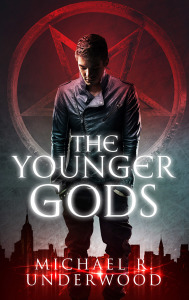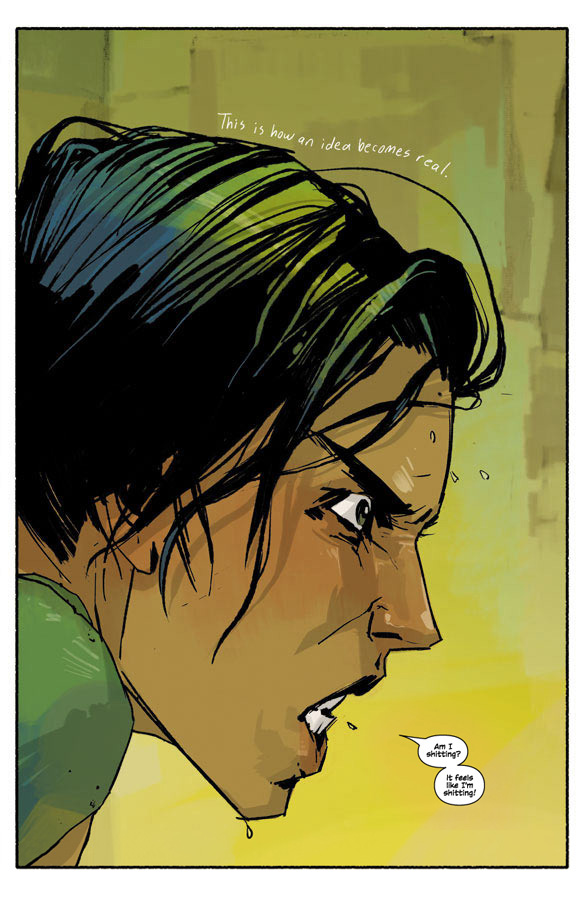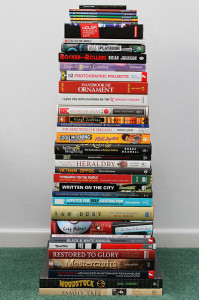Here it is, a big 2014 in review post. 2014 has been a hell of a year, in great and terrible ways, across most axes of my life. It is a year that will not soon be forgotten, that’s for damned sure.
The Good
Three New Books
I had three new book releases this year, all in ebook and audio, and one in trade paperback (my first print release). That’s pretty freaking amazing. If I’d accomplished nothing else in 2014, this would still be a win. I’d had one book out each of 2012 and 2013, so jumping up to three book releases was a huge step for me and my writing career.
Those three books, in case you’re new to the Mike-verse, are:
Attack the Geek: A Ree Reyes Side-Quest – a long novella in the Ree Reyes/Geekomancy series. It’s short, action-and-character-driven.
Shield and Crocus: A superhero epic fantasy set in a city built among the bones of a titan. It’s my attempt to combine my favorite parts of the New Weird and Superhero genres.
The Younger Gods: A supernatural thriller starring the one moral son in a family of sociopathic sorcerers who want to bring on the apocalypse.
Writing Breakthroughs
In addition to releasing new books, I was also writing new books. I wrote Hexomancy, the third Ree Reyes novel, as well as revising the releases for this year. I also wrote three novellas in a new series which I should be able to talk publicly about very soon *plotty fingers*. All of these were written very quickly (for me). I wrote the first draft of Hexomancy (72k words) in a month, which was a total process breakthrough for me. When I finished that draft, I was exhausted, depleted, but totally excited. The major question I had was this: Can I do it again? Or was this an aberration?
Then, in about six weeks from the very end of October through the first week in December, I wrote another 70k ish words for the rough drafts of the three novellas. That’s not nearly as fast as the Hexomancy draft, but this was a new series as opposed to a series I’ve been writing for multiple years. If I can consistently produce at the 70k in 6 weeks rate? That would be a total game changer for my writing career.
Outlining
One of the reasons why I was able to pull of these strong production schedules is that this is the year I made a major move along the Outliner/Pantser continuum. Thanks to books like 2K to 10K by Rachel Aaron, the videos/tutorials from the folks at the Self-Publishing Podcast, and Mary Robinette Kowal’s Writing on the Fast Track class, I changed my outlining and pre-production process, giving myself a much clearer outline to work from, as well as learning how to design more of the story ahead of time so that my first-drafting time was more focused on moving forward and less on having to stop and figure out what to do next. I’m still refining my pre-production process, trying to figure out what parts of the world and story I need to have at least penciled in before drafting begins. And considering the production schedule I’ve set for 2015, I’m going to need all of the help I can give myself.
Conventions
In addition to tons of writing, I went to a lot of conventions. Eleven of them, in fact. About half were for work, half were on my own as a writer. I met a bunch of cool people, connected with fans, plotted with fellow authors and with my Angry Robot peeps, sold a bunch of books at the consumer shows, and decided to expand my writing career into comics.
Also, I was nominated for a Hugo Award as part of the Skiffy and Fanty Show, which is amazing. We didn’t win, but getting to participate in the pomp of the Hugo Awards as a nominee was a total delight.
In those eleven conventions, learned a lot about what makes conventions work and not work, what I want out of conventions, and how to approach a convention in a focused way to pursue that agenda.
And More
I’m also planning a wedding, co-hosting a readings series, participating in a podcast, and geeking out as much as I can.
The Bad
I Was an Adventurer Like You, Then I Took An Arrow in the Knee
Well, not an arrow. My fiance and I moved across town to a new (awesome) row-home in February, but there was a price. As a result of a day spent tromping up and down stairs with heavy boxes and crawling over the center console of my car to drive back and forth (you see, the driver’s side door was broken because fun), I did something truly unkind to my knee. Walking more than a half-mile or so hurt, driving hurt, and the moderate-intensity exercise regimin I’d been doing was right out. Even using my treadmill desk as a standing desk hurt.
It sucked. I babied the knee for a while, and it got a fair bit better, but then I went and worked two conventions in two weeks, where I had to be on my feet and energetic for eight or so hours a day. And so when I came back, my mostly-better knee had gotten a lot worse. So I went to the doctor, I got an MRI, etc. And it turns out I’ve got a nice little bone spur on my knee that scrapes the tendons as I walk and move.
Sweet. No, wait, the other thing.
Anyway, I buckled down and went through a couple of months of physical therapy, which was incredibly helpful (I know know the terror and marvel of the foam roller. Oh, foam roller, my most hateful friend). I can drive more easily now, but it still hurts. I can use my treadmill desk again in a limited capacity, which is excellent. I’m hoping in 2015 I’ll be able to expand what I do for exercise and get back into some historical martial arts or tango, but it looks like the bone spur isn’t going anywhere unless I want to go get surgery, which I’d rather avoid if I can manage with PT and smart self-care.
The Ugly
The Summer of My Discontent
The knee thing was bad. What was worse is how summer went with my day job. Our owners decided to put the whole company up for sale, but we weren’t allowed to talk about it at all, under threat of losing our jobs. Which meant I spent most of the summer worrying about whether I was going to lose my job and having very little control over much of anything.
That was not fun. In fact, it was pretty miserable. For a lot of reasons.
Luckily, we found a buyer, we’re no longer beholden to the old owners, and the company is back, with grand plans for 2015, and my quality of life at the job is way better, and will be even better when our publishing program resumes in March.
Takeaways
So, that’s a lot. A lot of good, some not-so-good, and many lessons.
Here are my big takeaways from the year:
- Discipline and planning have a direct relationship to my speed of production.
- Some separation between work and my personal life is good, even in a job I love.
- Conventions are fun, but they require a plan just like every other part of the business.
- Surprisingly, I am mortal, and I need to take care of myself and listen to my body.
Looking Forward to 2015
Where 2014 was a big year in writing and life, 2015 is promising to be even bigger. I’ve got a lot of work planned to be completed in 2015, including some very exciting stuff. I’m going to get married in 2015 to the coolest, smartest, funniest woman I know, and we’re throwing (two?) parties to celebrate that marriage with friends and loved ones. And there’s a ton of books and movies and comics and TV I’m excited about enjoying over the next year.
2014, you’ve been instructive in a bunch of different ways.
Roll on 2015.





